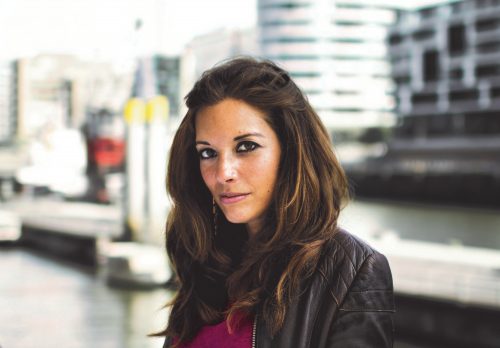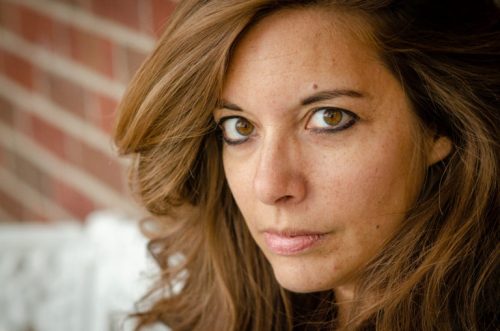
A representative of a new generation of German authors named ,,Migrutanten” (debuting writers coming from migration families) and one of the most respected contemporary writers of that country Rasha Khayat is a guest of the Montenegrin writer Dragana Kršenković Brković. It was Kršenković Brković who translated part of Khayat’s first novel into Montenegrin language for ARS in 2018. Khayat will also visit Book fair in Podgorica.
Khayat is a writer and translator. She was Dortmund, grew up in Jeddah, Saudi Arabia, only to return to Germany in the late 80s. She lives and works in Hamburg. She graduated from comparative literature, German and philosophy at Bonn University.
She is the author of ,,Weil wir längst woanders sind” (Because We’re Elsewhere Now) about a brother and a sister who are growing up between Germany and Saudi Arabia. This novel has been nominated for the Klaus Michael Kühne Prize for the best first novel in 2016. It was translated into French and Arabic.
Khayat also translate novels and short stories, as well as drama, from English and Arabic into German language. She writes for the theater and numerous literary magazines as well, mainly on multiculturalism. She has a blog that serves as a window into the Arab world for native Germans.
She is a winner of many fellowships: Jürgen Ponto Foundation Fellowship, the Robert Bosch Foundation’s Research Fellowship, the Siegfried-Lenz Fellowship, Max Kade Foundation, as well as residency in Writer in Residence, University of East Anglia in Norwich, UK (2016); OMI Writers, OMI International Arts Center, Ledig House, New York (2017); International Writing Program, The University of Iowa, the US (2018), Literarisches Colloquium Berlin, Berlin, Germany (2019).

You are a guest of Montenegrin writer Dragana Kršenković Brković at this year's Book Fair in Podgorica. How much does her invitation mean to you and how familiar are you with Montenegrin literature?
– I was lucky enough to meet Dragana during a residency in 2017, at Ledig House in New York. We spent a lovely month there with other writers and shared lovely talks and moments. Therefore, I am so incredibly pleased that we will finally have the chance to meet again. I am very much looking forward to spending a lovely time with Dragana again and get to know Montenegro. I have never been there before and I am afraid I am not very familiar with Montenegrin literature. But I am really curious and happy to be there during the book fair and can't wait to experience the writing scene there.
Having in mind the evolution of technology, what seems to be a double-edged sword, where do you see the literature in all this? Has the importance of the book been lost?
– I don't believe the book will ever lose its importance completely. But of course, digital age is a massive challenge in many aspects. Many people prefer to watch Netflix for example, but also the attention span of readers is getting shorter. I myself had this experience lately, I was spending too much time on social media and decided a few months ago to leave all my social media. I deleted my Instagram and left Facebook. Ever since then, I feel much better, I am able to focus again on properly reading a book and of course also writing. The impact of social media on publishing is massive, publishers making contracts with Instagrammers just because they have thousands of followers, and they hope this will translate to sales numbers. I don't think this is a good development at all, the general quality of literature is suffering as a result of this. But like any new-ish development I believe this will regulate itself at some point. At least I hope so.
What are your first memories of reading the book, do you remember the first book you have read?
– My grandmother was the person who introduced me to books at a very young age. She was a brilliant reader, she read to me all the time, and these are my first memories – sitting on a sofa with my grandmother, begging her to read to me more and more for many hours. One of the first books I then ,,read” myself was the one I would want her to read to me most often, it was a children’s book about a little mouse who collects light and colours for the dark winter days and it is called ,,Frederick”.
In Cairo, you found yourself again and this is where the idea for the first book ,,Weil wir längst woanders sind” (For We Are Elsewhere Now) was born. There is also Marseille as an important place. Where was the idea for the second book born and when is it expected to be published?
– The idea for the second novel already materialized while I was working on the first book. A very small part of the first book is set in the industrial region of the Ruhr, and I realized I really wanted to write about that region and the people who live there. It is a region very close to my heart and very little had been written about it, at least not in the way I want to try and tell the story. We hope it might be published by the end of next year, but I am still in the middle of writing, so I hope I will be able to finish it by then.
The second book is once more about some kind of escape, about immigration, about how a young woman leaves her daughter with her parents to run away from her old life and even the relationship between mother and daughter. How do you actually see that escape of a man and can a man essentially escape from oneself, wherever one goes?
– I absolutely believe that everyone always takes himself with him or her, wherever they go or escape to. Sooner or later, things catch up with you. And for me, that's what is interesting in terms of a conflict to write about. Many people talk about escaping all the time – escape their job, their relationship, their family, their lives. But very few people actually do it. For me, it is interesting to imagine what happens to a system when someone actually goes through with the idea of leaving, and also why they want to leave in the first place – what are the reasons, the motives, the hopes for a great escape. In my first book, it looks like the escape turns into a success, more like an arrival than an escape. In the second book, the situation is more extreme. I am still in the middle of writing and haven't fully figured out how it all will play out. But for me it's interesting to look at people's fears – because what else is an escape? You're afraid and you run. At the same time, it is fear that keeps people from running away, fear of consequences. These kind of conflicts interest me very much.
Branko Miljković, himself a poet and translator, wrote ,,I was killed by a word that was too strong”. The word can also elevate a person, make one feel better. As a writer and a translator yourself, what does the word mean to you?
– I love words. Words are my favourite thing in the world. I love language and linguistics, I actually read dictionaries for fun. I love finding out where certain words or idioms come from, I love to experiment with the sounds of different languages, dialects, melodies in languages. A word is a powerful thing. And you only realize how powerful, when it is taken away from you – when you can't express yourself, maybe because you don't speak the language, or when you experience silence by someone who won't let you speak, who refuses to use their words with you, who forces you to be silent. To me, words are instruments of great power. That's why we must treat them with a lot of care, and we should never stop learning about this great instrument. That also includes to learn how to listen, not only how to speak and write.
Bojana Radonjić


